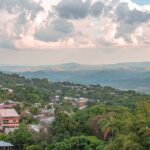It was a hot and sunny afternoon in a village nestled within Ecuador’s Chocó Andino de Pichincha Biosphere Reserve when the door to a more sustainable and just society opened in Natalia Ruiz-Guevara’s mind. The Peruvian forest engineer and Latin American Model Forest Network co-chair was touring this biodiversity hotspot to collaborate with residents there to understand how each person’s actions impact their neighbors and the ecosystems they all rely upon for health, food, water and livelihoods.
The model forest network Ruiz-Guevara co-leads promotes better conservation and production practices that residents living and working in forests across Latin America can use. Simultaneously, they encourage a region’s stakeholders to jointly manage the land and resources. As Ruiz-Guevara stood in front of a center that cared for vulnerable children and talked to its director, she realized a community’s sustainability wasn’t just about protecting trees and restoring ecosystems. The way to nurture the environment for current and future generations would be to go straight to the hearts of those who had the power to repair degraded land and water.
“It was like a light in the darkness for me,” Ruiz-Guevara said. “I didn’t understand the connection between something like family conflicts and the way we take care of our natural surroundings before speaking with the center director—but we cannot restore and manage our land and resources if we are broken people. You need to be secure in your livelihood, your access to life’s necessities, and be psychologically healthy before you will look out for the health of nature and the rest of society.”
When voices are silenced
Across Latin America, many groups of people are not offered a seat at the table during regional land and resource planning conversations. Whether those discussions are happening in government hearing rooms or public squares, young people, women, Indigenous communities and other marginalized groups rarely have their opinions heard or acted upon.
The ecosystems that everyone relies on suffer because so many citizens are left voiceless.
Continue reading the story here.
—–
This story was written by Michael Keller, Communications lead for 1000 Landscapes. It was originally posted on February 1st, 2024 as part of Forbes EQ BrandVoice, a partnership spotlighting organizations championing representation, inclusion & systemic equity.


